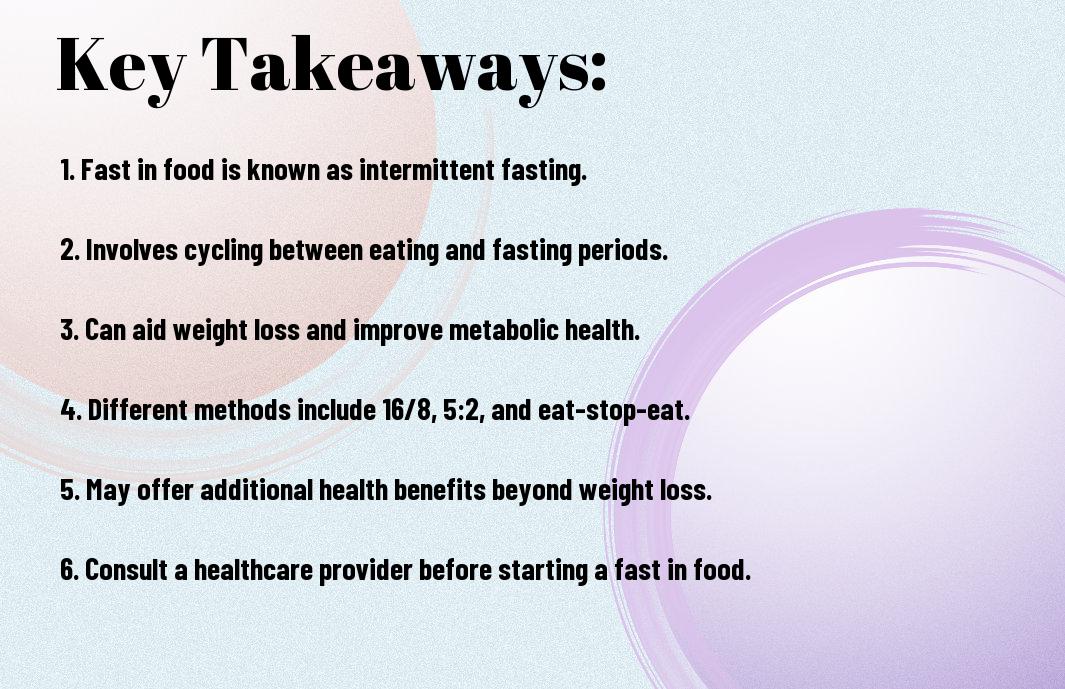Food fasting can be a powerful tool for improving your health and well-being. When you fast, you give your body a break from digesting food, allowing it to focus on repairing and rejuvenating itself. It is crucial to understand the different types of fasting and their effects on your body. To learn more about the benefits of fasting, check out To Fast or Not to Fast.
Key Takeaways:
- Definition: A fast in food involves abstaining from consuming certain foods or drinks for a specified period of time.
- Types of Fasts: Fasts in food can vary, including intermittent fasting, water fasting, juice fasting, and religious fasts.
- Purpose: Fasting in food can have various purposes such as weight loss, detoxification, spiritual reasons, or improving overall health.
Definition of Fasting
To truly understand the concept of fasting, it’s crucial to explore into its historical context and explore how it has evolved over time.
Historical context of fasting
Fasting has been practiced for centuries across various cultures and religions for spiritual, health, and even political reasons. In ancient times, fasting was believed to cleanse the body and mind, promoting clarity and purification. Some cultures observed fasting as a way to demonstrate discipline and self-control. In religious contexts, fasting is often associated with sacrifice and seeking a deeper connection with a higher power.
Modern interpretation of fasting
To understand fasting in today’s context, it’s vital to recognize that it has taken on new meanings beyond the traditional practices. In modern times, fasting is often linked to health and wellness trends, with intermittent fasting gaining popularity for its potential benefits such as weight management, improved metabolism, and increased energy levels.
Plus, fasting in the contemporary world is not limited to abstaining from food but also includes concepts like digital fasting, where individuals take a break from technology to promote mindfulness and mental well-being.
Types of Fasting
Clearly, there are various types of fasting that people practice for different reasons. Each type of fasting involves abstaining from food or reducing food intake for a specific period. Here are some common types of fasting:
| Intermittent Fasting | Prolonged Fasting |
| Water Fasting | Juice Fasting |
Intermittent Fasting
Any form of fasting that cycles between periods of eating and fasting is considered intermittent fasting. This type of fasting is popular for its flexibility and potential health benefits. Common methods include the 16/8 method, where you fast for 16 hours and eat within an 8-hour window, or the 5:2 method, where you eat normally for five days and restrict calories for two non-consecutive days.
Prolonged Fasting
Intermittent fasting typically involves shorter fasting periods, while prolonged fasting extends the fasting duration to several days or even weeks. Prolonged fasting can be challenging and should be approached with caution, preferably under the guidance of a healthcare provider. It is imperative to stay hydrated and ensure proper nutrient intake during prolonged fasting.
Types of fasting can have various effects on your body and overall well-being. Each type offers unique benefits and considerations, so it’s imperative to choose a fasting method that aligns with your health goals and lifestyle.
Water Fasting
For some people, water fasting involves consuming only water for a specified period, typically ranging from 24 hours to several days. Water fasting is believed to help detoxify the body, promote weight loss, and improve metabolic health. However, it is crucial to consult a healthcare professional before attempting a water fast, especially if you have underlying health conditions.
This approach to fasting may not be suitable for everyone, and it’s important to listen to your body’s signals and adjust your fasting routine accordingly. Always prioritize your health and well-being when experimenting with different fasting methods.
Juice Fasting
To detoxify the body and boost nutrient intake, some people opt for juice fasting, where they consume only fresh fruit and vegetable juices for a designated period. Juice fasting provides imperative vitamins, minerals, and antioxidants while giving the digestive system a break. However, juice fasting may lack imperative nutrients like protein and fats, so it’s imperative to ensure a balanced diet before and after the fast.
This type of fasting can be a refreshing way to reset your eating habits and increase your intake of micronutrients. Remember to consult a healthcare provider or nutritionist before commenceing on a juice fast to ensure it aligns with your health goals.
Benefits of Fasting
Weight loss and improved metabolism
Your body can experience weight loss and improved metabolism through fasting. When you fast, your body is forced to use stored fat for energy, leading to weight loss. Additionally, fasting can enhance your metabolic rate, making it more efficient in burning calories even after the fast is over.
Improved mental clarity and focus
Benefits of fasting extend to improved mental clarity and focus. When you fast, your body enters a state of ketosis where it uses ketones for energy, providing a steady fuel source to your brain. This can result in enhanced focus, concentration, and mental acuity.
Fasting has been linked to increased production of brain-derived neurotrophic factor (BDNF), a protein that promotes neural health, cognitive function, and mood regulation. By boosting BDNF levels, fasting can support your overall brain health and cognitive performance.
Enhanced autophagy and cellular cleaning
Improved autophagy and cellular cleaning are key benefits of fasting. Autophagy is a process where your body removes damaged cells and debris, promoting cellular rejuvenation and overall health. Fasting triggers autophagy, allowing your body to cleanse and renew its cells, which can have anti-aging and longevity benefits.
By enhancing autophagy, fasting supports the removal of toxic proteins and waste products from cells, helping to optimize cellular function and reduce the risk of various age-related diseases. This cellular rejuvenation process can contribute to your overall well-being and vitality.
Increased human growth hormone production
Focus on increased human growth hormone (HGH) production can be a significant benefit of fasting. HGH is a hormone that plays a crucial role in growth, metabolism, and muscle strength. Fasting can stimulate the production of HGH, which can aid in fat loss, muscle gain, and overall body composition improvements.
Higher levels of HGH due to fasting can also promote collagen production, enhance skin elasticity, and support tissue repair and regeneration. This hormonal response to fasting can have positive effects on your physical health, appearance, and athletic performance.
How Fasting Affects the Body
Insulin sensitivity and blood sugar regulation
Unlike when you are constantly consuming food throughout the day, fasting allows your body to regulate insulin sensitivity and blood sugar levels more effectively. When you fast, your body is not constantly digesting food, which gives your pancreas a break from producing insulin. This break can improve insulin sensitivity, making it easier for your body to regulate blood sugar levels efficiently.
Hormonal responses to fasting
Body hormones play a crucial role in how fasting affects your body. When you fast, your body undergoes hormonal changes that can impact various functions. For instance, fasting can increase the production of norepinephrine, a hormone that helps your body burn fat for energy. Additionally, fasting may also lead to higher levels of growth hormone, which can aid in muscle preservation and repair.
Effects on digestion and gut health
Sugar sensitivity, when you fast, your digestive system gets a chance to rest and reset. Giving your gut a break from constant digestion can improve gut health by allowing the gut lining to repair and replenish healthy bacteria. This break can also help reduce inflammation in the gut and improve overall digestive function.
Impact on immune system function
Plus, fasting can have a positive impact on your immune system function. An extended fast gives your immune system a break from constantly fighting off pathogens and allows it to focus on repairing and rejuvenating immune cells. This can help improve overall immune function and reduce inflammation in the body.

Preparing for a Fast
All Intermittent fasting: What are the benefits? begins with preparation. Setting clear goals and expectations is crucial before launching on a fasting regimen. One of the primary goals of fasting may be weight loss, improved metabolic health, or simply to reset your eating habits. By outlining what you hope to achieve, you can tailor your fasting approach to suit your objectives and monitor your progress effectively.
Setting goals and expectations
One important aspect of setting goals for fasting is to be realistic about what you aim to achieve. Define what success looks like for you, whether it’s losing a specific amount of weight, gaining more energy, or improving your overall health. By understanding what you want to accomplish, you can stay motivated throughout your fasting journey and adjust your plan accordingly based on your progress.
Consulting a healthcare professional
Healthcare professionals can offer valuable guidance when it comes to fasting, especially if you have underlying health conditions or concerns. Before starting any fasting regimen, it’s crucial to consult with your healthcare provider to ensure that fasting is safe and appropriate for you. They can provide personalized recommendations based on your medical history and help you set realistic goals that align with your overall health objectives.
goalsWhen consulting with a healthcare professional, be sure to discuss any medications you are taking, existing health conditions, and any concerns you may have about fasting. Your healthcare provider can help you navigate potential risks and benefits associated with fasting, ensuring that you launch on your fasting journey with confidence and support.
Gradually introducing fasting into your routine
On the journey towards fasting, it’s imperative to ease into the process gradually. Rather than diving headfirst into an intense fasting routine, consider starting with shorter fasting periods or intermittent fasting schedules. By gradually introducing fasting into your routine, you allow your body to adjust to the changes and minimize potential side effects like fatigue or cravings.
Gradually By slowly increasing the duration of your fasting periods over time, you can build up your fasting tolerance and assess how your body responds to different fasting protocols. This approach can help you find a fasting routine that is sustainable in the long run and tailored to your individual needs and preferences.
Stocking your pantry with healthy foods
On your fasting journey, the foods you consume during your eating window play a significant role in supporting your overall health and well-being. For instance, ensuring that your pantry is stocked with nutrient-dense foods like whole grains, lean proteins, fruits, and vegetables can help you make healthier food choices during your feeding periods. By filling your kitchen with wholesome ingredients, you can stay on track with your fasting goals and nourish your body with imperative nutrients.

Common Challenges and Concerns
Hunger and cravings
Cravings can be one of the biggest challenges you face when fasting from food. Your body is used to a certain routine and intake, so when you suddenly change that, it’s natural to experience cravings for your favorite foods. It’s necessary to stay strong and remind yourself of the reasons why you’re fasting. Keep yourself busy with activities that can distract you from thinking about food, such as reading a book or going for a walk.
Common Energy crashes and fatigue
Common energy crashes and fatigue can occur when you’re fasting from food. Your body may be adjusting to the change in routine, which can lead to temporary dips in energy levels. It’s important to listen to your body and rest when needed during this time. Make sure to stay hydrated and incorporate light activities like yoga or stretching to help alleviate fatigue.
Social and emotional challenges
An important aspect of fasting from food is the social and emotional challenges that can arise. You may feel isolated or left out during meal times with friends or family. It’s necessary to communicate your fasting goals and reasons to your loved ones, so they can provide support and understanding. Find alternative ways to connect socially that don’t revolve around food, such as going for a hike or attending a virtual event.
Dealing with criticism and skepticism
With fasting from food, you may encounter criticism and skepticism from others who don’t understand your choices. It’s necessary to remember that you’re fasting for yourself and your health, not to please others. Stay confident in your decision and politely educate others on the benefits of fasting if they question you. Surround yourself with a supportive community that uplifts and encourages your fasting journey.

To wrap up
Drawing together all the information presented in this article, we have explored the concept of what a fast in food is. We have learned that fasting in the context of food can vary from intermittent fasting for health benefits to religious practices like Ramadan. Understanding the different purposes and methods of fasting in food can help you make informed decisions about incorporating fasting into your lifestyle.
Whether you are looking to improve your health, spiritual connection, or simply explore new ways of eating, it is imperative to approach fasting in food with mindfulness and awareness of your body’s needs. By experimenting with different fasting techniques and listening to your body’s cues, you can find what works best for you and incorporate fasting as a beneficial practice in your life.
Q: What is fasting in food?
A: Fasting in food refers to abstaining from certain or all foods for a designated period of time. This practice is often done for religious, spiritual, health, or weight loss reasons.
Q: What are the benefits of fasting in food?
A: Fasting in food can have several potential benefits, including weight loss, improved digestion, detoxification, increased mental clarity, and potentially lower risks of certain chronic diseases.
Q: How should I prepare for a fast in food?
A: Before starting a fast in food, it is important to consult with a healthcare professional, particularly if you have any underlying health conditions. It is also imperative to stay hydrated, plan out your meals before and after the fast, and gradually ease into and out of the fasting period.



